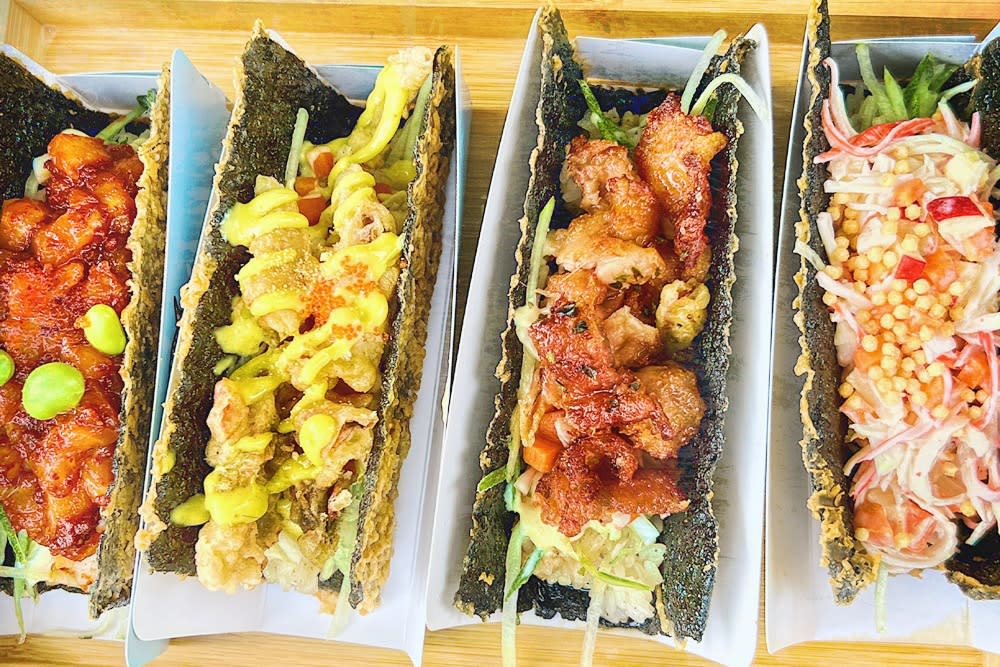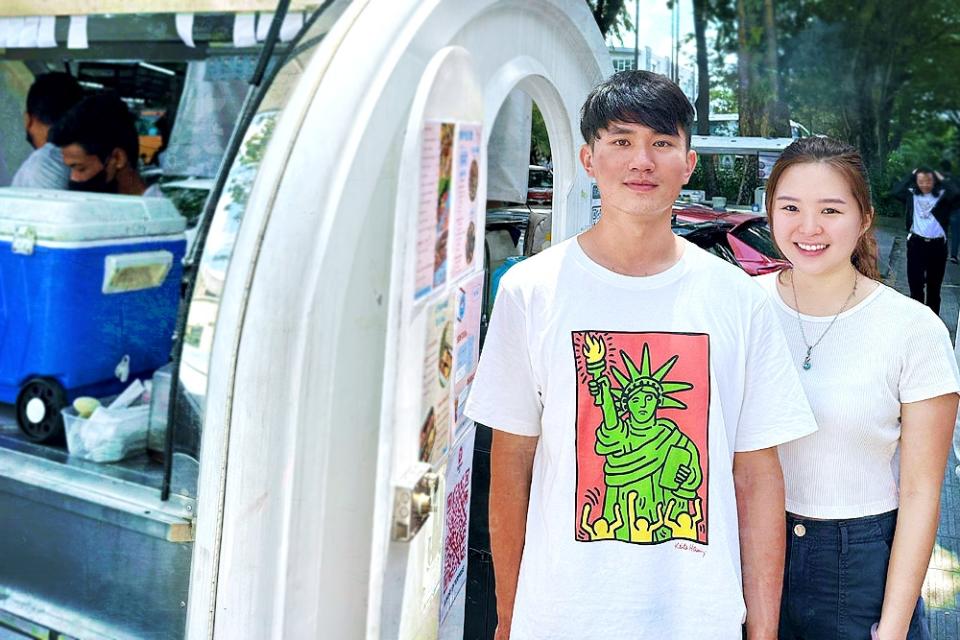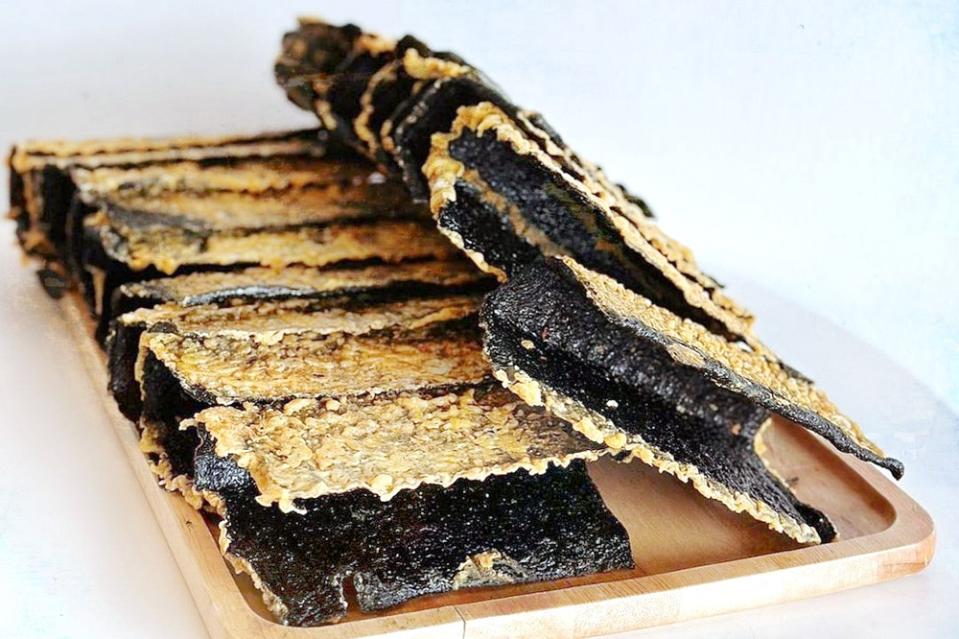Japanese flavours meet Mexican textures in Kinori’s colourful and creative seaweed tacos


PETALING JAYA, June 1 — What happens when Japanese flavours meet Mexican textures? If you’re a homegrown brand called Kinori, the results are colourful and creative nori (seaweed) tacos.
The Mexican element comes in the form of a crunchy taco shell; the Japanese part comes in with what the taco is made from — not a corn or wheat-based tortilla, but a freshly fried piece of curved seaweed.
The flavours run the gamut of Japanese influences — teriyaki ebi (fried shrimp with sweet glaze), unagi tamago (eel and omelette) and mentai mayo torched salmon (complete with green orbs of edamame) — to more varied inspirations, such as Spicy Korean Salmon and unusual yet unique Durian Sauce Chicken Karaage (a limited edition flavour).
These nori (seaweed) tacos are the brainchild of Chong Ka Fei, 27, who first started in the F&B industry when he was 17. He recalls, “I started working part time at a Japanese restaurant in my hometown of Kuala Kangsar, Perak. After SPM, I became a full timer there.”
The young future entrepreneur learned the ropes fast as a novice and kept looking for new opportunities. After a year of immersing in foundational Japanese cuisine, he moved to Singapore to work at Public Izakaya by Hachi.

The duo behind Kinori: Chong Ka Fei and Carine Hwong.
Within a year, Chong was promoted to the flagship restaurant in the same group — Hachi, where he learned about kaiseki cuisine (traditional Japanese multi course meals).
Two years later, Chong furthered his pursuit of Japanese cooking techniques by moving again, this time to Melbourne, where he first worked at Ichi Ni Nana Izakaya and later at Golden Gai, a Japanese fusion restaurant and bar.
“The menu at Golden Gai was created by Michelin-starred chef Masahiko Yomoda,” Chong says. “He asked me to help him to work at another kaiseki restaurant called Ishizuka. Hence, I worked at two restaurants at the same time: one from 10am-4pm, the other 4:30-10pm.”

Freshly fried ‘nori’ (seaweed) tacos.
This sheer diligence and vigorous ambition to master as many different Japanese cooking techniques as he could served Chong well once he returned to Malaysia, this time to start his own food business — using everything he had picked up along the way in his culinary journey.
Together with his business partner Carine Hwong, 26 (a psychology major), Chong started a food truck selling nori tacos.
He explains the reasoning behind creating this fusion product: “We chose nori tacos as we love Japanese food so we want to make it fun, delicious and convenient. The name Kinori comes from ki which means ‘energy’ in Japanese and nori, obviously, is seaweed in Japanese.”

Chong’s personal favourite ‘nori’ taco, the Yuzu Chicken Karaage.
At the moment, Kinori’s food truck is located in front of Sunway University. Chong says, “This is the easiest way to penetrate and showcase our product, as well as the mobility a food truck allows us. Our target market are young working adults and university students who love on-the-go food and enjoy convenience through our Japanese quick service restaurant (QSR) concept.”
With so many different tempting flavours, Chong confesses his personal favourite nori taco is the Yuzu Chicken Karaage as the tori karaage (fried chicken) “is very flavourful with a hint of tanginess and sweetness.”

Unusual and unique: the Durian Sauce Chicken Karaage ‘nori’ taco.
He adds, “The biggest challenge in creating a recipe is achieving the taste that we want using halal-certified ingredients only because many imported Japanese ingredients are not halal-certified. Hence, we need to find the right substitute.”
According to Chong, Kinori is Muslim-friendly as no pork, lard or alcohol is served. He says, “All our ingredients are halal-certified with an ultimate goal of obtaining the Jakim Halal Certificate.”
There have been other challenges along the way.
Some are more commonplace, such as product R&D and recipe development. Chong notes that certain nori taco flavours such as “the Spicy Korean Salmon requires 12 ingredients to make the sauce! A lot of trial-and-error needed to be done.”

Perfect for parties: A big box of 10 assorted flavours.
Other problems only became apparent as their operations matured. He shares, “We faced issues when the second-hand equipment we purchased did not function well. Therefore, it required more time and manpower to complete our tasks.”
Moving forward, the Kinori duo is on the lookout for a suitable kiosk in a shopping mall or perhaps a hole-in-the-wall shop. Something more permanent than a food truck. Upcoming products will include onigiri (Japanese rice balls), a series of matcha beverages, as well as new nori taco flavours such as tom yam and salted egg yolk.
When you have culinary creativity and a colourful imagination, the sky’s the limit. That tom yam nori taco is beginning to sound pretty good right now...
Learn more about Kinori at instagram.com/kinori_official/
* Follow us on Instagram @eatdrinkmm for more food gems.



